The best daypacks: for shorter hikes and casual walks
Our selection of the best daypacks features lightweight backpacks for speedier hikes and walks in the backcountry
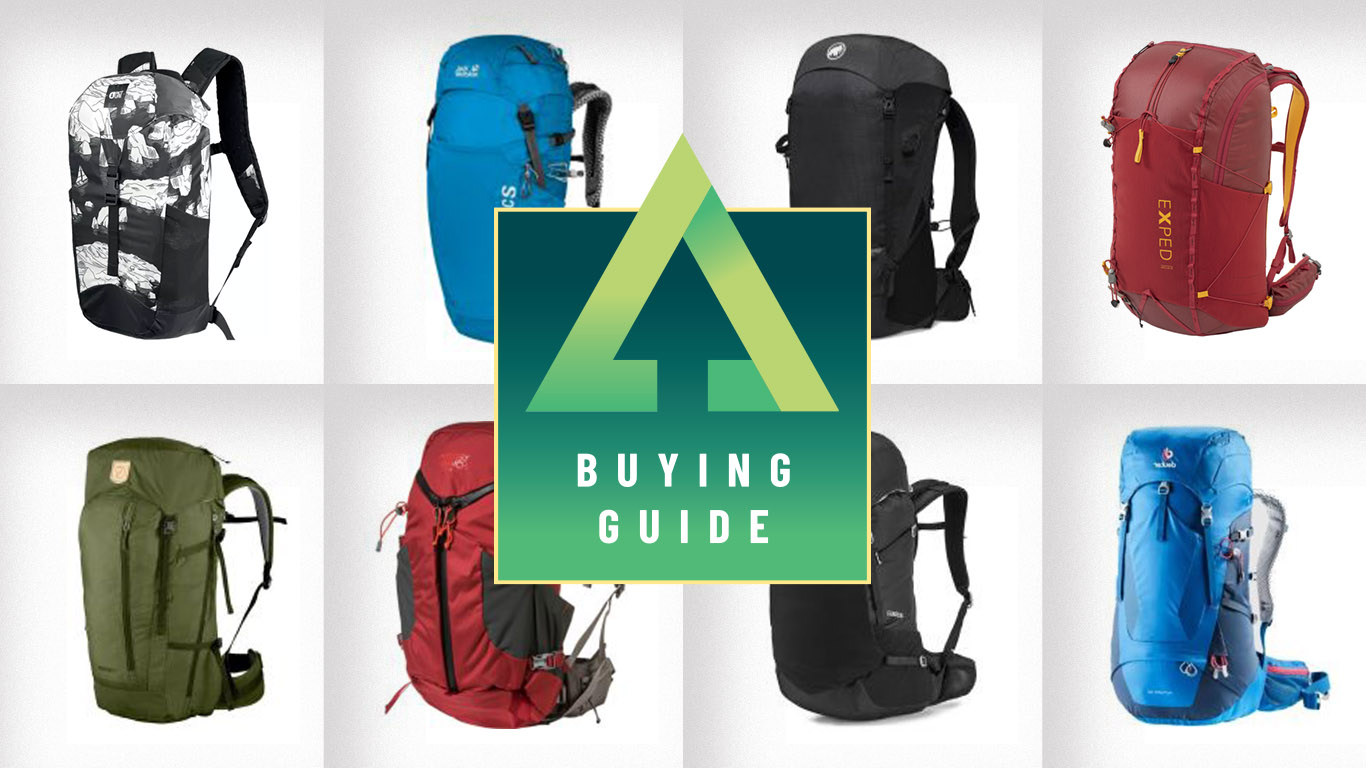
To bring you this definitive guide to the best daypacks, we've been hitting the backcountry trails in all conditions. All the packs featured here have proved their worth on long hikes and other outdoor adventures, providing the right balance of comfort, space, and ease of access to your gear – and in some cases, the abilily to keep kit completely dry.
A daypack occupies the middle ground between a runner's hydration pack and larger expedition packs designed for multi-day adventures and travelling. They tend to be lightweight but still give enough storage for a big day in the hills.
As with all hiking backpacks, every daypack is different. In this guide we feature day packs for technical hiking; waterproof daypacks that work beautifully for both hikers and water sports enthusiasts; specialist climbing and mountaineering packs; larger daypacks for longer hikes and lightweight camping; small packs for casual walks; and we also feature a women's specific pack too.
For comfort on technical trails, we love the Exped Impulse 30L and the Osprey Manta 24, while we rate the Black Diamond Speed Ascent as the finest option for climbers and mountaineers.
The best daypacks for technical hiking
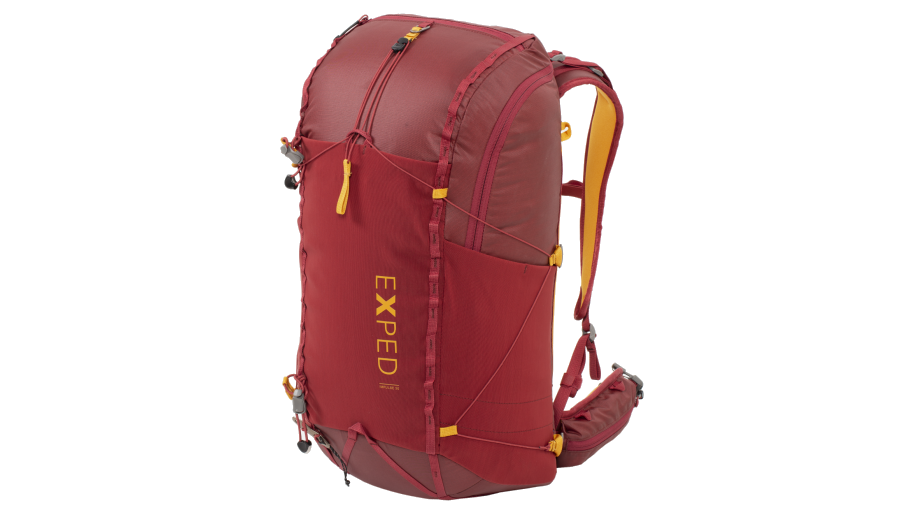
1. Exped Impulse 30L
Our expert review:
Specifications
Reasons to buy
Reasons to avoid
A design-savvy Swiss-brand, Exped has established itself as a firm favourite with outdoor types, with an army of loyal fans who rave about their kit – everything from trusted daypacks to flock lined sleeping mats and pop-coloured dry bags. True to form, the Exped Impulse 30 backpack is a tough, multi-functional beast of a backpack. Made from a durable 210 Denier material, on test we found this daypack will withstand the toughest abrasion when scrambling through the mountains, but equally be at home when you’re out and about on the hills, thanks to its versatile system. There are a number of adaptable features, from a removable back plate, to detachable hip belts for those who prefer to keep their adventures fast and light.
We liked its several well-considered technical features, from an inside mesh pocket to zipped pockets on the hip fins, which shows Exped really understand what hikers (and bikers, climbers, fastpackers) want from their packs: space to organise their kit and plenty of pockets. The internal mesh pouch is for holding a hydration bladder, plus there’s a clip to keep the reservoir in an upwards position. An addition, two mesh side pockets make it easy to stow away drinks bottles to walking poles, making it the perfect practical pack for a multitude of activities. What’s more, the pack has some of the greenest credentials if those on test, with the Oeko tex standard 100 certification, meaning every component has been checked to make sure the materials are not harmful to human health, whilst also being certified as PFC free. For those who want a backpack that can adapt to a range of mountainous and hill activities – this pack is perfect.
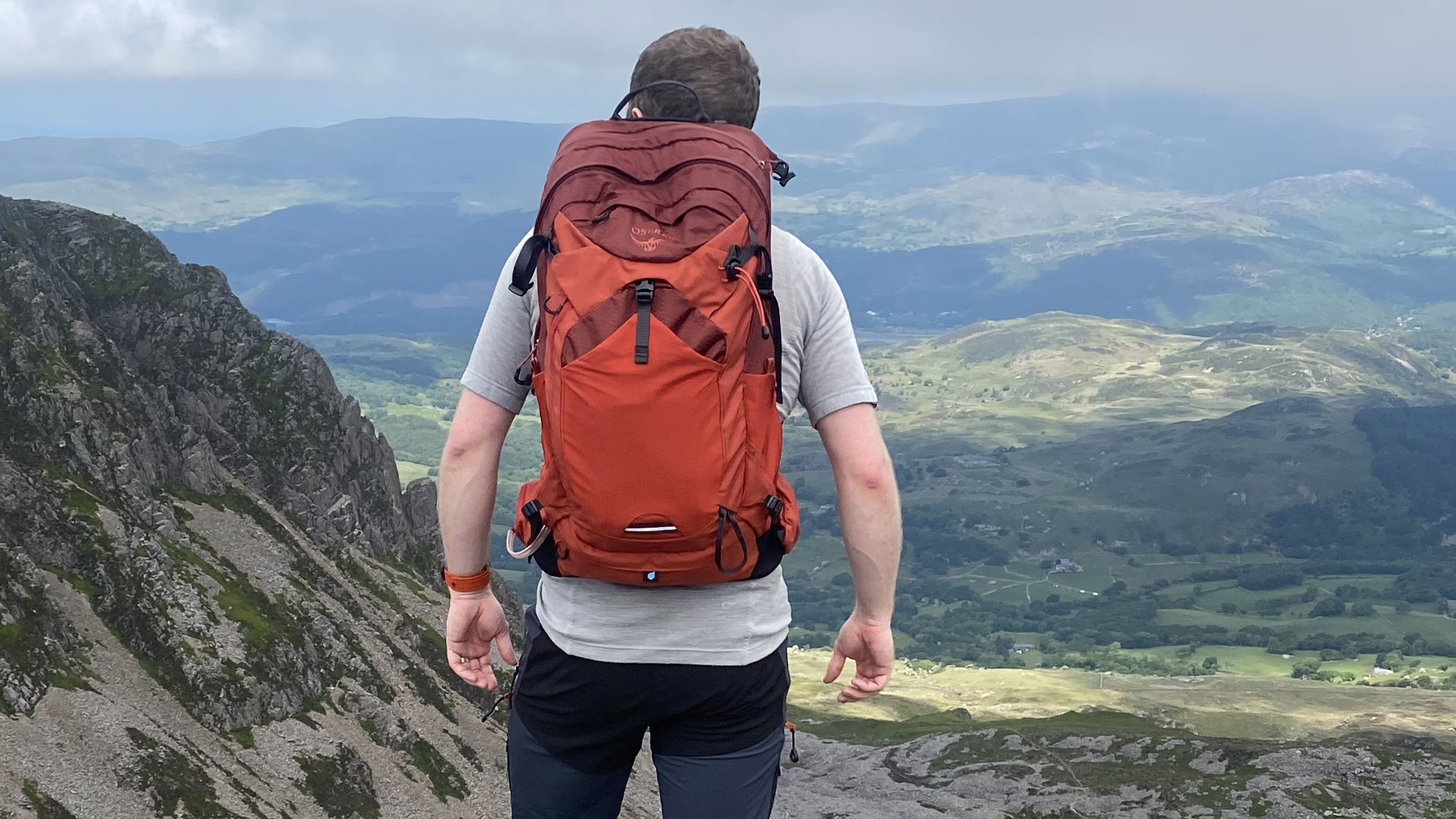
Specifications
Reasons to buy
Reasons to avoid
The Manta (male) and Mira (female) packs are for those looking for a premium, gender-specific hydration day pack that’ll deliver excellent performance and comfort for technical mountain hikes. They include a 2.5-liter hydration bladder as standard and feature quality fabrics and components throughout.
Its 24 liters of capacity are spead across 10 separate compartments, making it a pack ideal for system-orientated hikers. Meanwhile the build quality and comfort of the harness system has more in common with much larger packs than this, which hints at how comfortable the pack is to wear, which we can testify too having tested it on the mountain trails.
There are little innovative touches throughout, such as the magnet fastening for the hydration reservoir's drinking tube on the sternum strap. This held the bite valve in place and out of the way while we were hiking. Add to all this the premium, bluesign approved, 100% recycled 210D honey comb nylon and you've got an excellent and durable pack for mountain adventures.
Read our full Osprey Manta 24 review
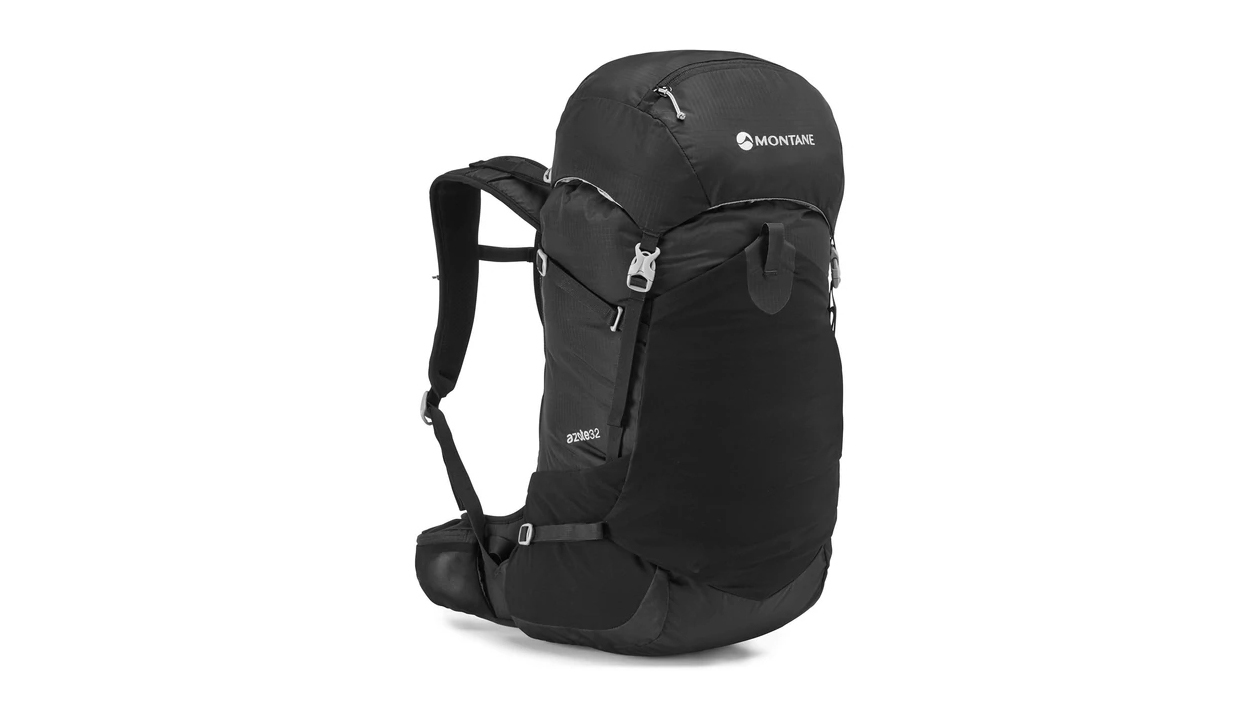
3. Montane Azote 32
Our expert review:
Specifications
Reasons to buy
Reasons to avoid
Not every trip into the outdoors is an alpine epic, and many backpacks are made overly complicated with fussy features and endless straps that most people will never use. Not so the Montane Azote 32, which is brilliantly designed to deliver everything you need for everyday escapades, as well as some extra capability for peak-grabbing adventures (including a pole and axe attachment), but with a clean look and more minimalist finish.
Note: this is the largest in a range that includes a 30L pack with a women-specific harness, and two smaller models for warmer/shorter/faster days out, when you don’t need so much stuff.
On all Azote packs, the main harness is constructed with breathable mesh, with a foam frame behind it to minimise contact with your lower back, which we found on test significantly reduced sweating. The packs feature the ZephyrAD back system, which is fully adjustable. The waistbelt has hip fins that sit comfortably where they are meant to (with a women’s specific design on the 24l and 30L packs), which are endowed with decent pockets. The pack’s adjustable sternum strap has a Click-and-Go system, so you can operate it with one hand (even with gloves on).
Impressively, the Azote is mostly made from recycled fabric (the main section is constructed with RAPTOR Eco 100 denier Robic Nylon – 78% recycled), which is both durable and lightweight. One downside is a lack of integrated rain cover.
The best waterproof daypacks
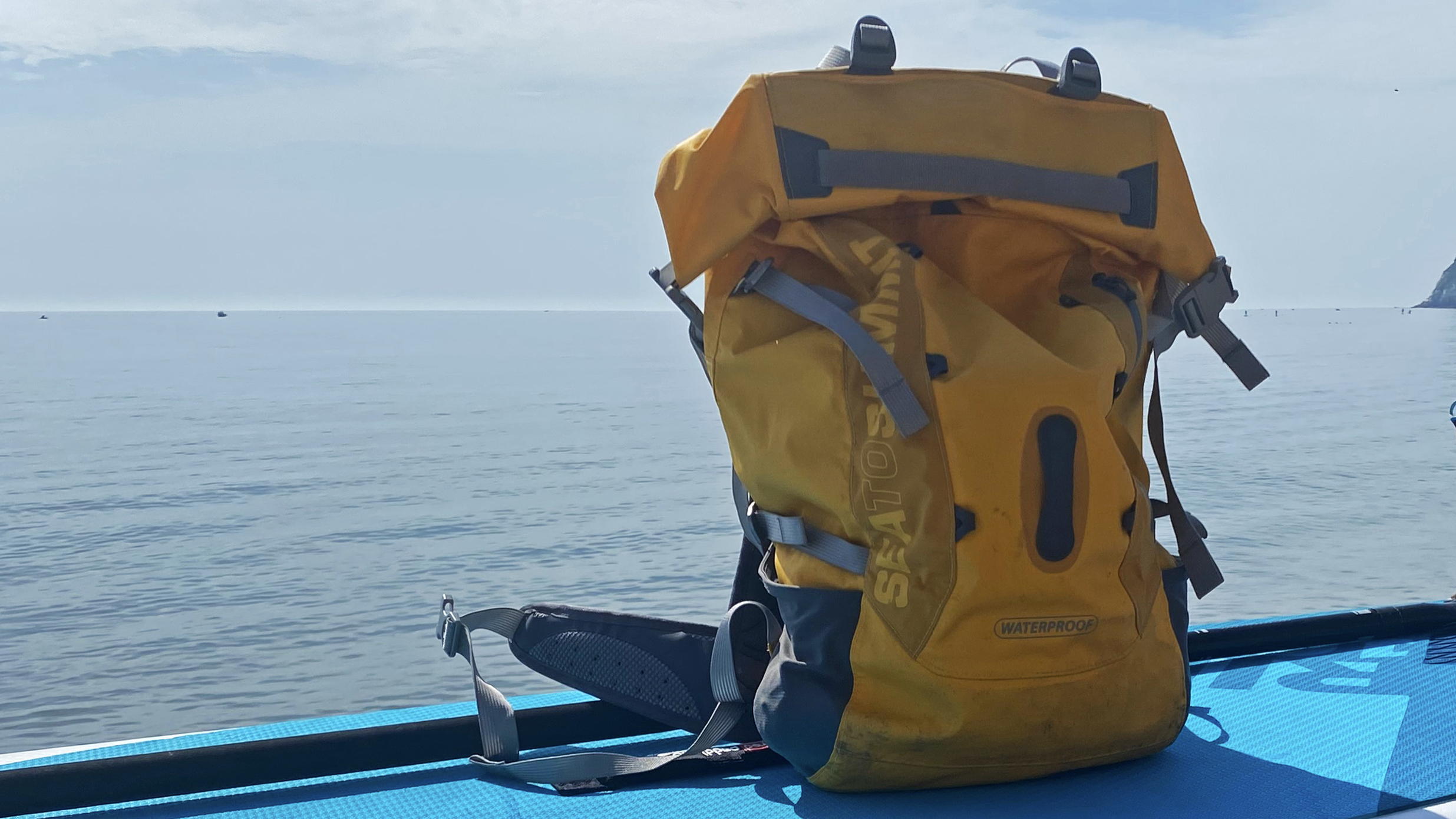
Specifications
Reasons to buy
Reasons to avoid
The Flow Dry Pack from Sea to Summit is an ultra-versatile bag that can be used to keep kit completely dry during one- or two-day treks in potentially torrential rain and snow, or employed for coasteering and canyoning adventures, or to act as a multifunctional storage option when you’re out paddling a kayak, canoe or stand-up paddleboard.
Made with TPU laminated, 420D Nylon, the main compartment is completely waterproof. With a generous 35-litre capacity, the top rolls down like a dry bag, and then clips into buckles on the side to complete the waterproof seal.
Importantly, the harness is excellent, with really comfortable shoulder straps made from foam and breathable mesh, a sternum strap and a great waist belt. One gripe we do have is that the pack sits directly on your back with no features to create any airflow – aside from a large inlaid Sea to Summit logo, which doesn’t cut the mustard – so it can be a bit sweaty to wear. There are some other negatives – including the price tag, which is very high, and the fact that no recycled materials have been used in its construction – but this is an excellent pack that we expect to last for many years.
Read our full Sea to Summit Flow 35L Dry Pack review
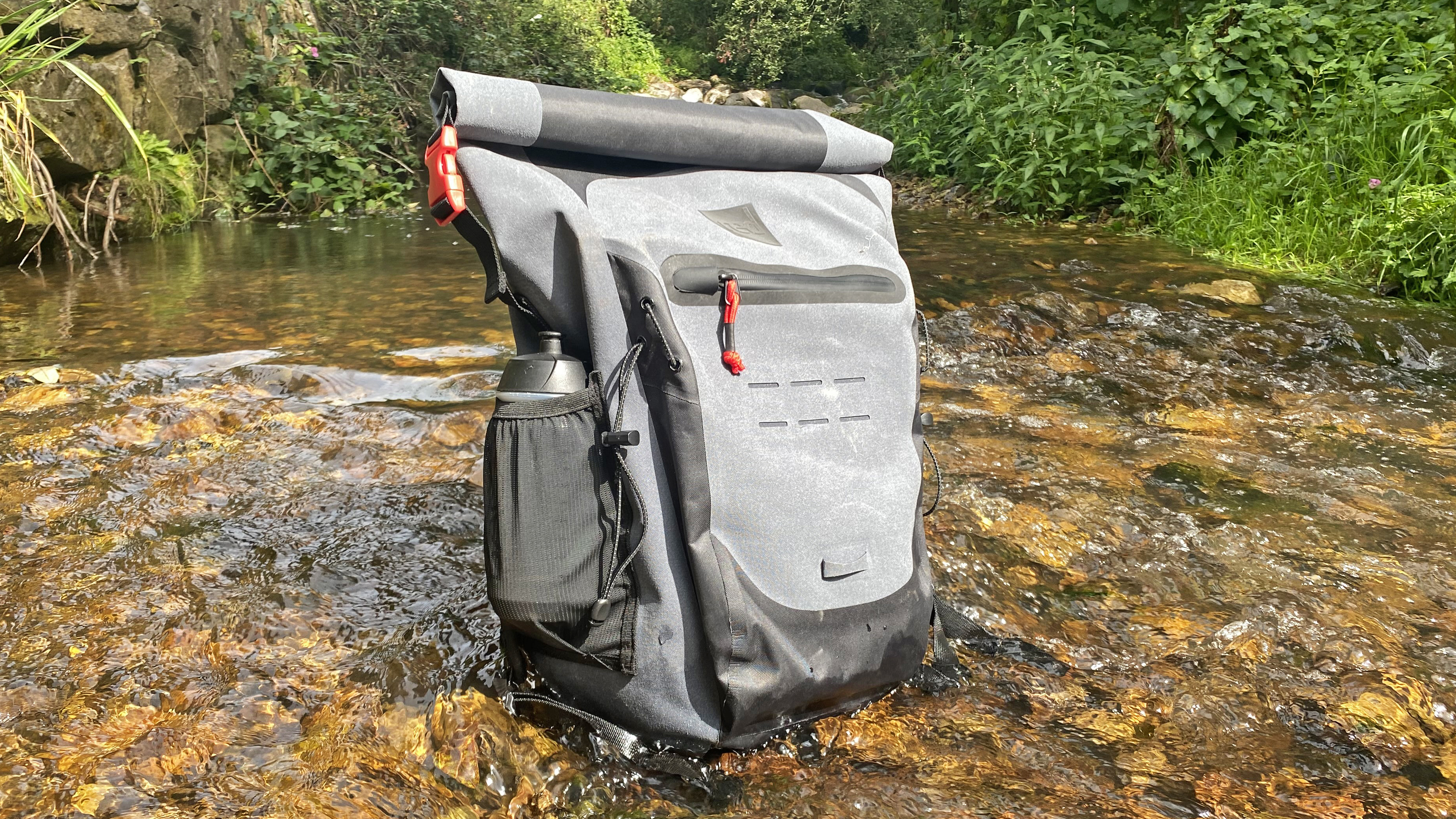
Specifications
Reasons to buy
Reasons to avoid
Made entirely from recycled plastic bottles, this generously proportioned daypack from fully certified B-corp British company Red Original (most famous for producing some of the best stand-up paddleboards around) has a fully waterproof 30-litre main compartment that will keep your gear safe and dry during even the most torrential downpours.
The pack can be closed like a dry bag (by rolling the top over at least three times and clipping the ends together), or you can roll the top down as per above, and use the side clips. These options make it possible to compress the bag, or use it to its full 30-litre extent, depending on how much kit you’re hauling. It also provides a couple of alternative ways to attach the bag to a boat or board, if you’re taking out on the water in a canoe, kayak or on a SUP – all of which it is perfectly possible to do.
On test, we found it to be a robustly built pack, one which we expect will last for many years of pretty heavy use. This bag is really in its element in and around water, but it’s a decent pack for use on drier trails too.
Read our full Red Original Waterproof Backpack 30L review
The best daypacks for climbing and mountaineering
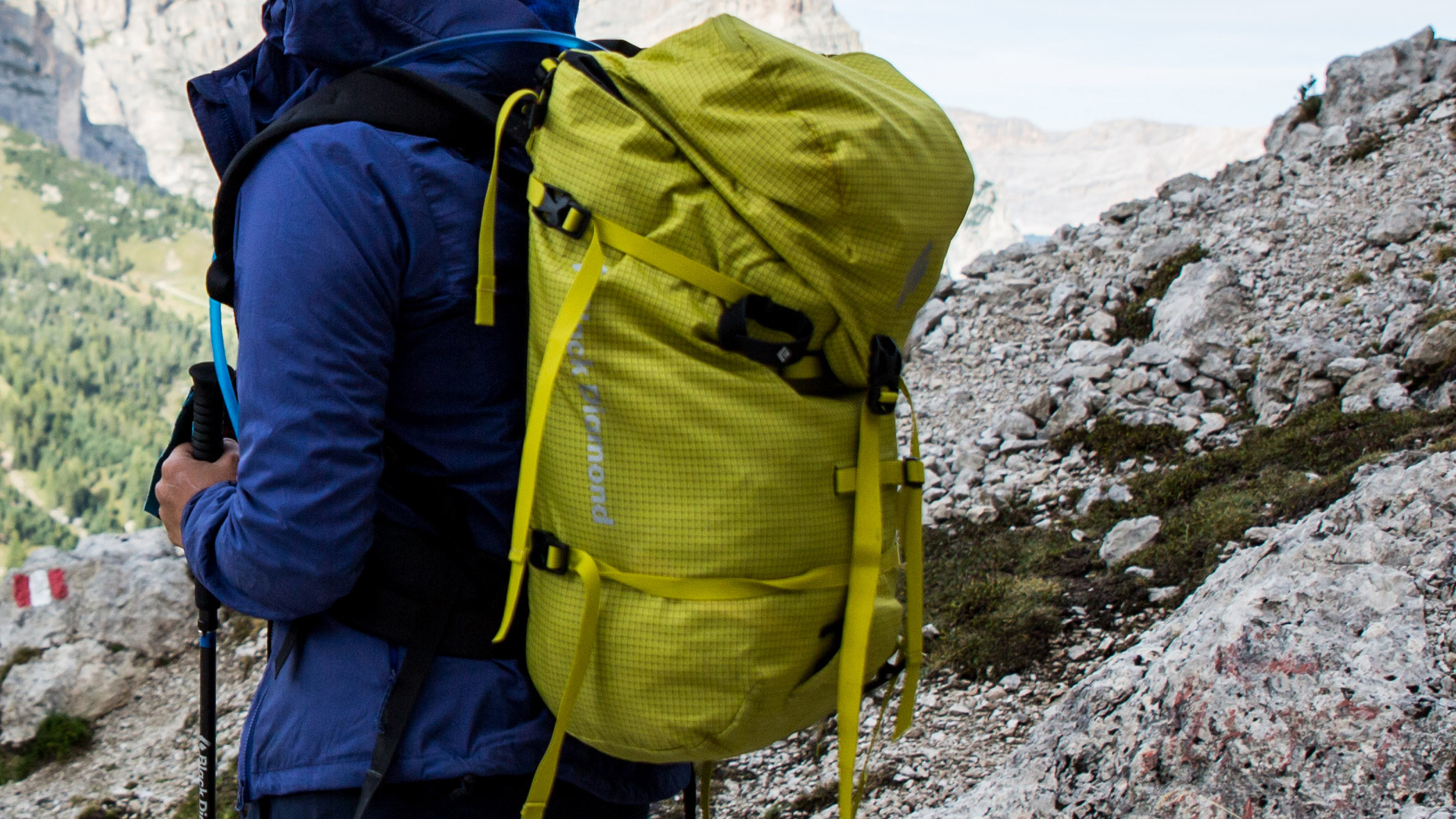
Specifications
Reasons to buy
Reasons to avoid
Combining the light feel and ultra-tough durability of a high-performance alpine-orientated backpack with a fully strip-downable design – including removable waist belt, lid and frame sheet – the Speed 30 from Black Diamond’s Ascent range makes an ideal choice for climbers, scramblers and mountain folk. Our favourite features include a top-loading hood buckle that’s easily closable, even with gloves on; a drawcord skirt at the top, which is useful for stopping spindrift and snow getting in to the pack; and a welded front abrasion patch that protects the pack from jagged rocks and crampons.
The shoulder straps are made of dual density foam, which are comfortable to wear on long approaches and big days in the peaks, and the rear panel has been redesigned to improve its wicking performance. Fans of fast-and-light design will appreciate the smart simplicity of this pack, which is easy to use even in extreme circumstances. A highly durable bag, made with Black Diamond’s new ‘X-rip’ 210d Nylon body fabric with a UTS coating that’s ultra-tough and resistant to scuffs, this product is ideal for all-year-round use on mountain terrain. As with most mountaineering and climbing packs, there’s a lack of pockets, but the Speed boasts plenty of useful tool attachments, including a new custom metal dogbone ice tool attachment with micro ice-tool PickPockets and removable 20 mm crampon straps.
Read our full Black Diamond Speed 30 backpack review
The best large daypacks
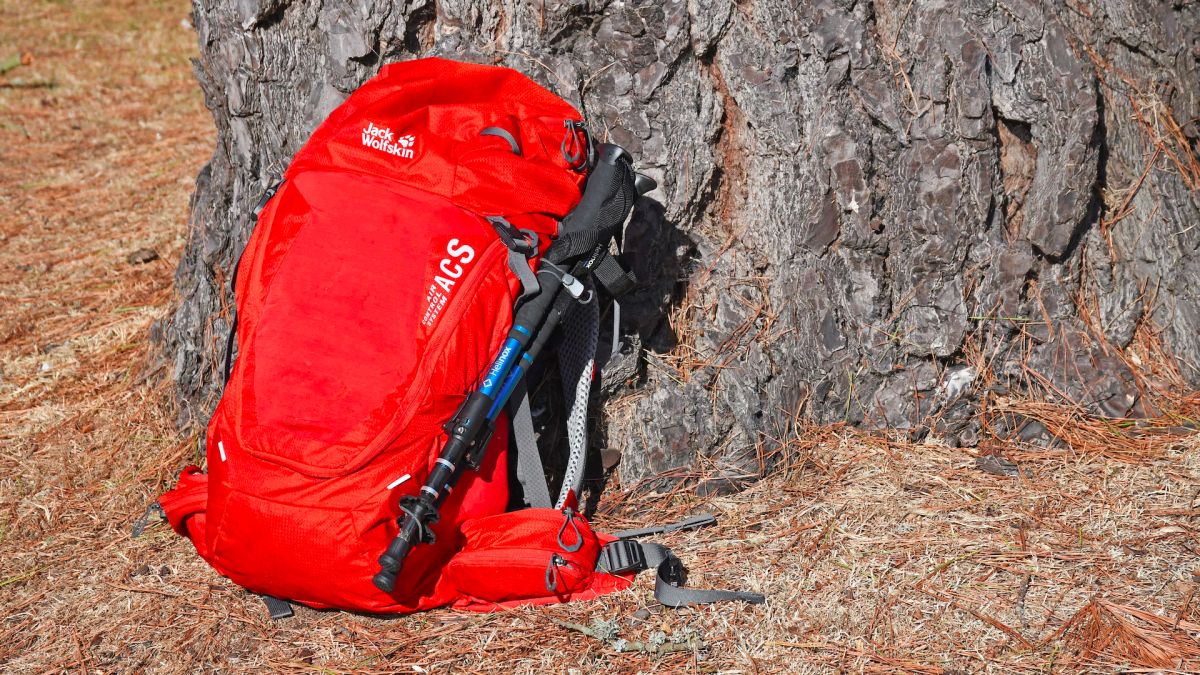
Specifications
Reasons to buy
Reasons to avoid
This generously proportioned daypack has a large main compartment, capable of taking enough gear to see you through a lightweight overnight adventure or multi-day walk if you’re going from hut to hut or using some other accommodation. It’s designed primarily for big days in the hills, however, with tailor-made carry hoops for technical items such as trekking poles. On test, we found the ACS (Air Control System) harness to be comfortable and easily adjustable (with a pull-forward tightening system), although the waist belt is a bit narrow and the sternum strap can come detached from the pack and get lost if you’re not careful.
The rear of the pack is concaved and a mesh effectively kept our backs nice and ventilated. The main compartment is accessible from the front of the pack via a large semi-circular zip that open the pack right up, and is extremely useful for finding buried items without emptying the entire bag on the side of the trail. There are loads of pockets and extra storage pouches, so we found organising our kit was easy.
The lid has two zipped pockets, one on the inside and one on the outside. There is a huge pouch on the front of the pack for stashing larger items you want to keep easy access to (such as maps and waterproofs) and deep bucket pockets on either side, for water bottles or a multitude of other things. The pack has an internal pouch and Velcro hanging hook for a hydration bladder, with the portal for the hose on the right shoulder.
Read our full Jack Wolfskin Crosstrail 32 LT daypack review
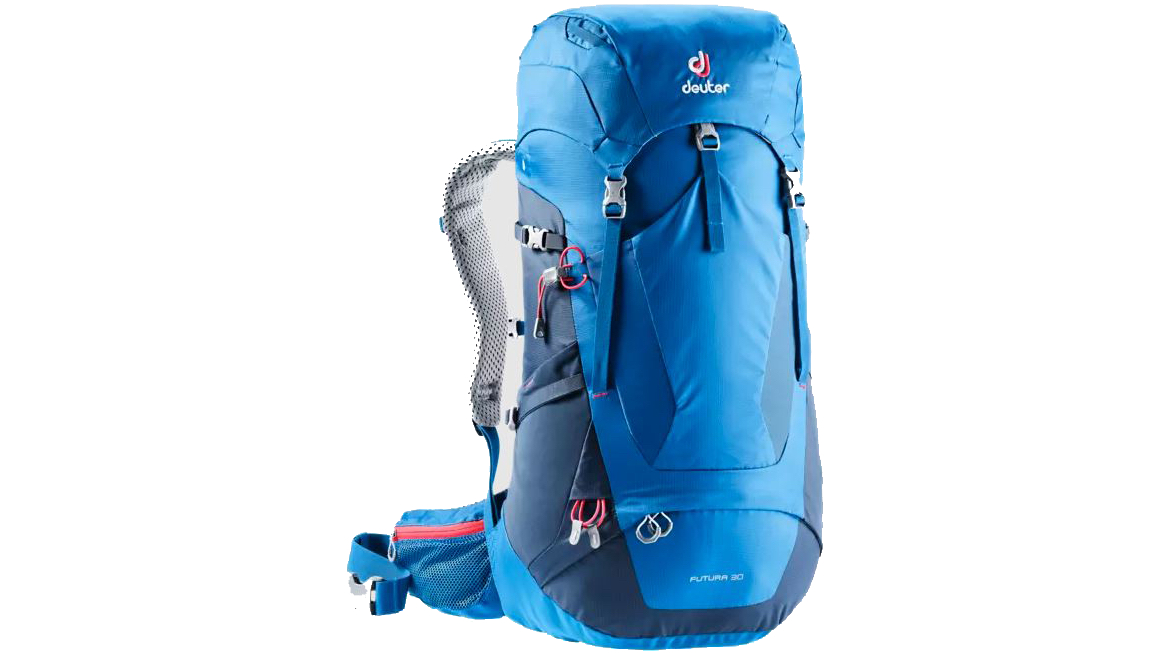
Specifications
Reasons to buy
Reasons to avoid
We found that the fit of this daypack is spot-on, carrying both light and heavy loads without shifting, even after hours on the trail or miles of scrambling. Venting panels on the shoulder straps and back support strike a good balance of moisture wicking and padding. Deuter has wisely eschewed side pockets (often more trouble than they are worth) for a streamlined, tight rear panel pocket and one-sided bungee strap for poles.
The pack comes with a rain cover, a nice bonus. Internal pockets include a hydration sleeve, a wallet/key fob pouch under the lid, and a generous top lid compartment. With 30L of storage, there will be no problem carrying gear in every season. Winter gear, dog supplies, and even a modest amount of climbing gear fit comfortably inside the pack. A final point of emphasis: the Futura 30 carries reasonably heavy loads with ease, but also doesn't float up your back when carrying lighter loads. As an all-around performer, the price and comfort can't be beat. The only consideration that might be off-putting is the larger size for hikers who prefer a more minimal pack set-up.
Read our full Deuter Futura 30 review
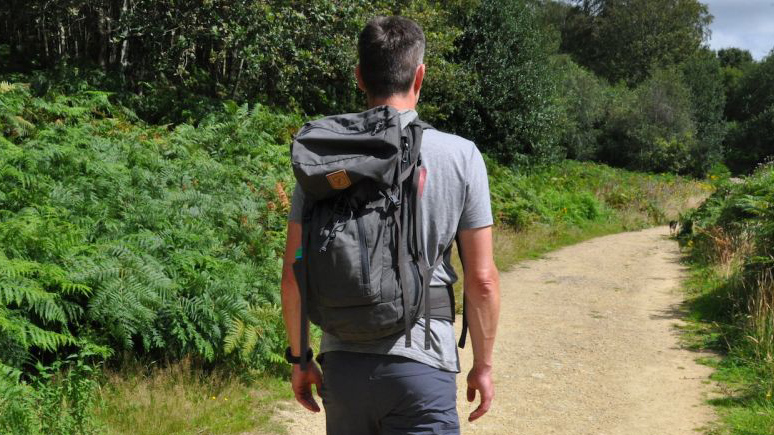
Specifications
Reasons to buy
Reasons to avoid
The beautiful-looking Abisko Hike 35 is sized in that sweet zone where it’s large enough to swallow enough equipment to see you through a quick overnight escapade (especially during summer, when kit requirements are less, or when you’re sleeping in a hut), but isn’t too big to be used for even the most casual day walk. It is made with materials that are organic or recycled, and features fluorocarbon-free impregnation, so the eco creds are high, and it’s really well designed too. Our favourite feature is the side zip, which allows you to access the main compartment and locate whatever you’re looking for (fleece, hat, food, bivvy, whatever) without having to dive in from the top and take everything out all over the trail.
The top lid has a spacious pocket, and there’s a large front-of-pack pocket, with a full-length zip, perfect for a map. There are several compression straps that help secure the contents and keep the pack tidy when it’s not full. The waist belt, with pull-forward adjusters, has substantial hip fins. There is a lack of easy access pockets on the harness, however, which is a bit of a shame, as these are always handy for storing snacks, compass and so on. It’s very comfortable to carry, with padded shoulder straps, a substantial hip belt and a lightweight frame that keeps the overall pack weight down. There is one side pocket for a water bottle – and the compression straps can be co-opted to secure trekking poles – and an internal pouch takes a hydration bladder, with a port for the hose to exit over the right shoulder.
Read our full Fjällräven Abisko Hke 35 daypack review
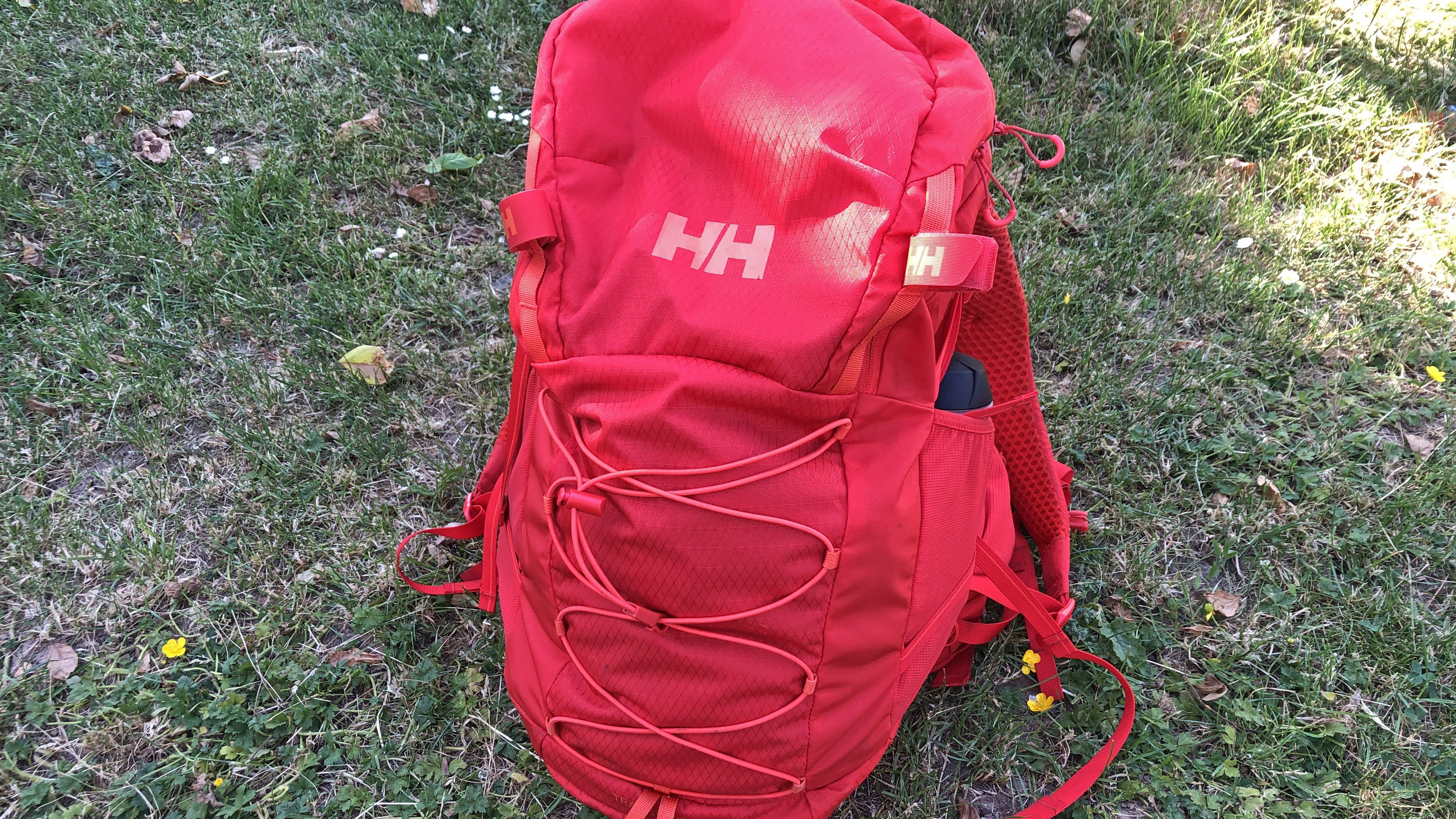
Specifications
Reasons to buy
Reasons to avoid
The Transistor backpack from Helly Hansen is a true daypack. We found it wasn't large enough to tempt us into trying to stuff a weekend’s worth of gear into it, but it is the ideal size to swallow a rain jacket and waterproof pants, a fleece, lightweight puffer, gloves and a hat, a packed lunch, map and whatever else might be needed for a fairly big day on the trails. It is also fully compatible with a hydration reservoir.
Access to the main compartment is via a lovely wide U-shaped top zip, which has a double zip and allows you to delve right in and find what you’re looking for. The Transistor has an internal zipped pocket, but annoyingly there are no pockets at all on the outside of the main bag (aside from one on the bottom, presumably designed to take a rain cover, which – also annoyingly – isn’t included). There are two zipped pockets on the hip wings too.
The backpanel, shoulder straps and hipbelts are all made with perforated EVA foam, covered with 3D airmesh, to facilitate ventilation. The hipbelts are very substantial and comfortable considering the small size of the bag. There is no women’s version, but the harness is adjustable, although it’s a fiddly business moving the sternum straps around, and you could loose the component parts. The clip on the chest strap has an integrated emergency whistle, and there is a version of this pack that features a Recco Reflector.
Read our full Helly Hansen Transistor Backpack review
Best small daypacks
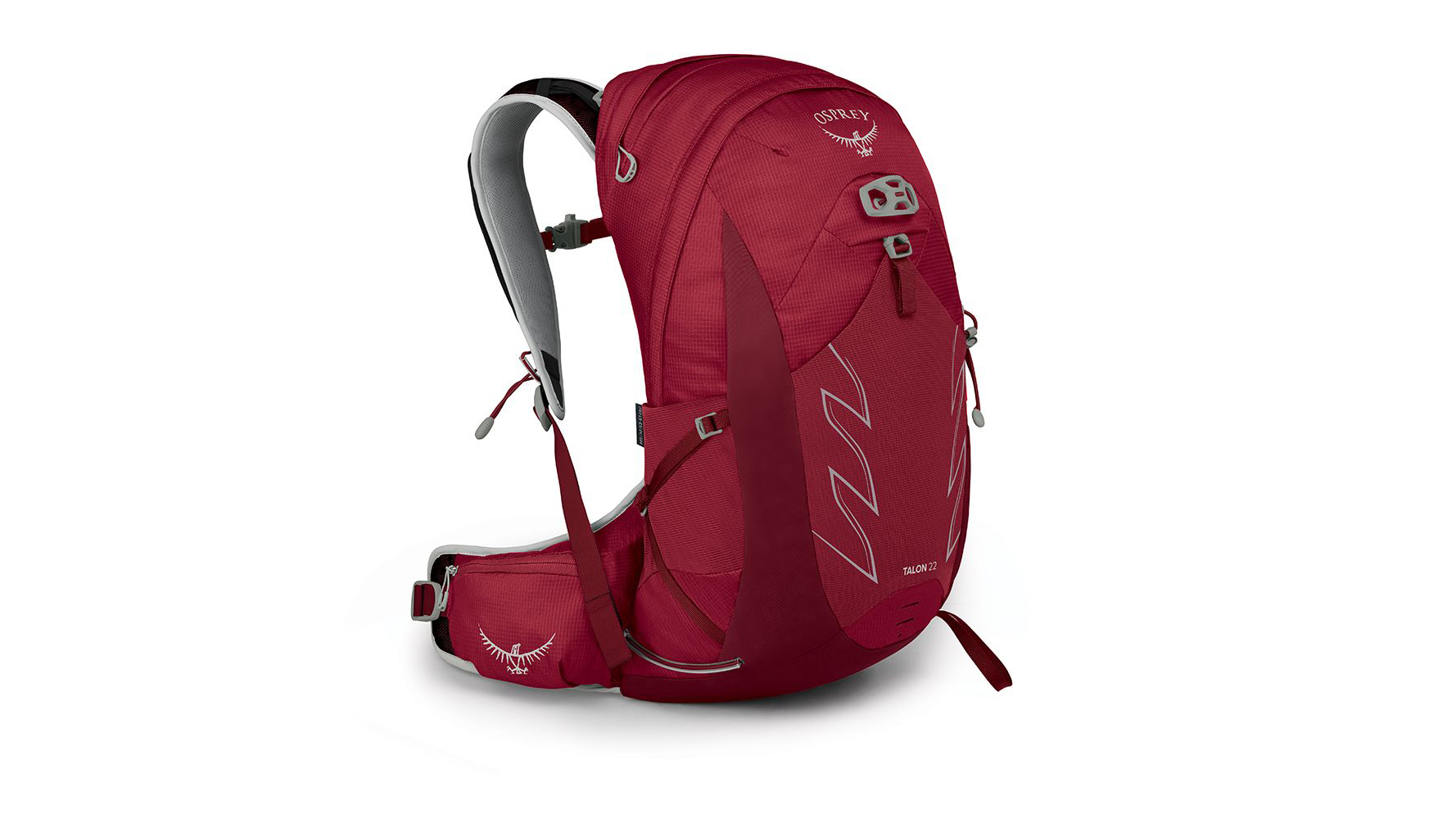
Specifications
Reasons to buy
Reasons to avoid
Osprey's Talon 22 hits a particular sweet spot for daypacks that are compact, comfortable, and reasonably priced. The suspension system utilizes a bioStretch harness, an elastic strap system that fuses with the well-vented shoulder straps and back panel. This creates a balanced fit that prevents the pack from wandering off your shoulders, even with a decent load.
Other smart features include a zipped top pocket, deep n' stretchy side pockets, and a snug rear panel compartment. Every element of the pack is nicely streamlined, which contributes to excellent stability even while scrambling or surfing scree. Another nice touch is the slightly oversized waist harness pocket, which is big enough to hold a smartphone and a few snacks.
Osprey's craftsmanship and attention to detail are apparent in everything from the smooth gliding zippers to easily adjusted strap sliders and rain cover. The Talon 22 is at home on every trail and can even serve light duty as a four-season pack. Given its compact design, the 22L volume is a bit small if you're carrying a lot of gear or weighed down with extras like climbing equipment.
Read our full Osprey Talon backpack review
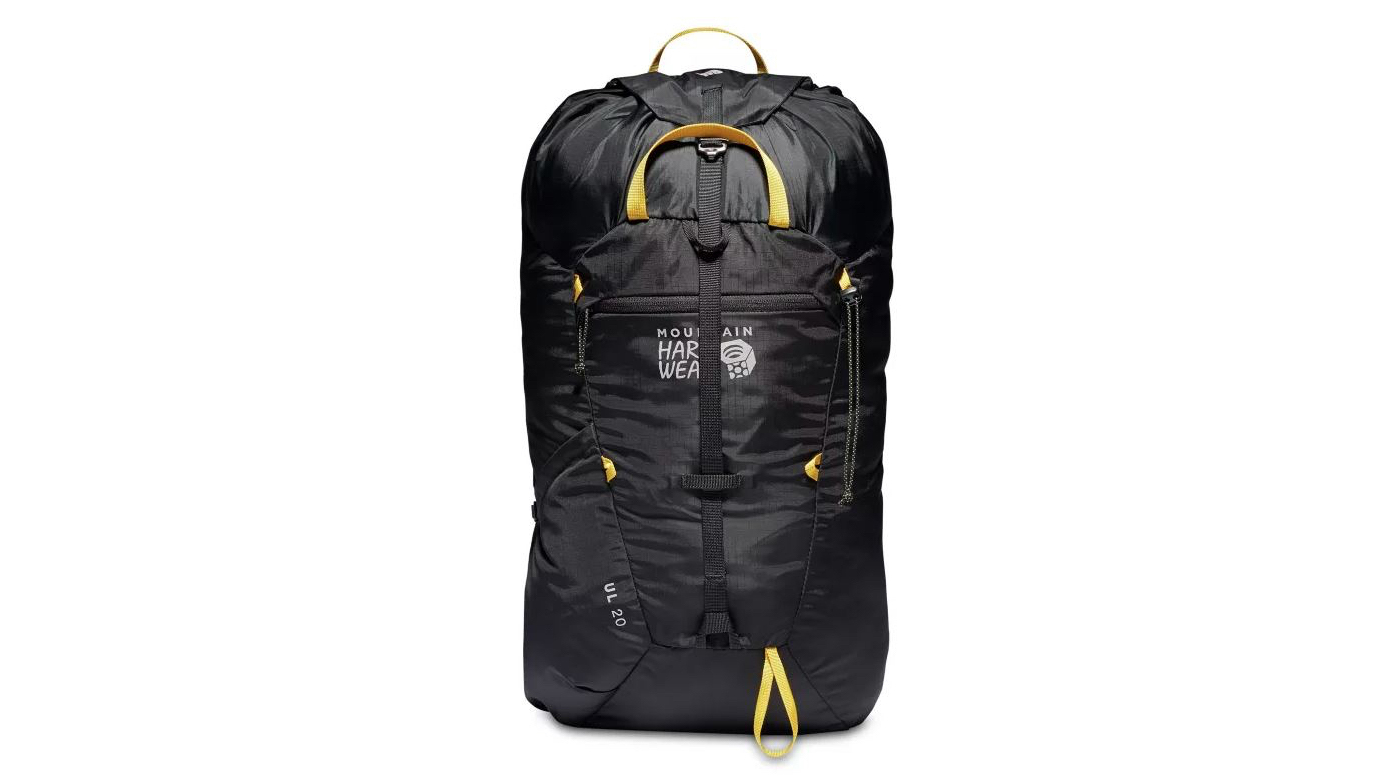
12. Mountain Hardwear UL 20
Our expert review:
Specifications
Reasons to buy
Reasons to avoid
The UL 20 is as light as a pack can get while still being functional. If you know exactly what gear you'll need on summit day and don't want to go an ounce heavier than you need to, this is your pack. Because it lacks a waist belt, Mountain Hardware astutely made sure the shoulder straps and sternum strap worked together to keep modest loads from shifting, which we can vouch for on test.
We like the way the single side pocket cinches tight, as a savvy decision as peak bagger may be carrying a single water bottle and having it fall out could be catastrophic. A single ice axe loop and sparse but functional gear loops on the back of the pack round out a functional design that can punch above its weight if needed. Confident summit hikers who know exactly what they need will be delighted by the profile and fit of the UL 20. Like other summit packs, it will likely find use as a pillow or stuff sack when not on its way to the top.
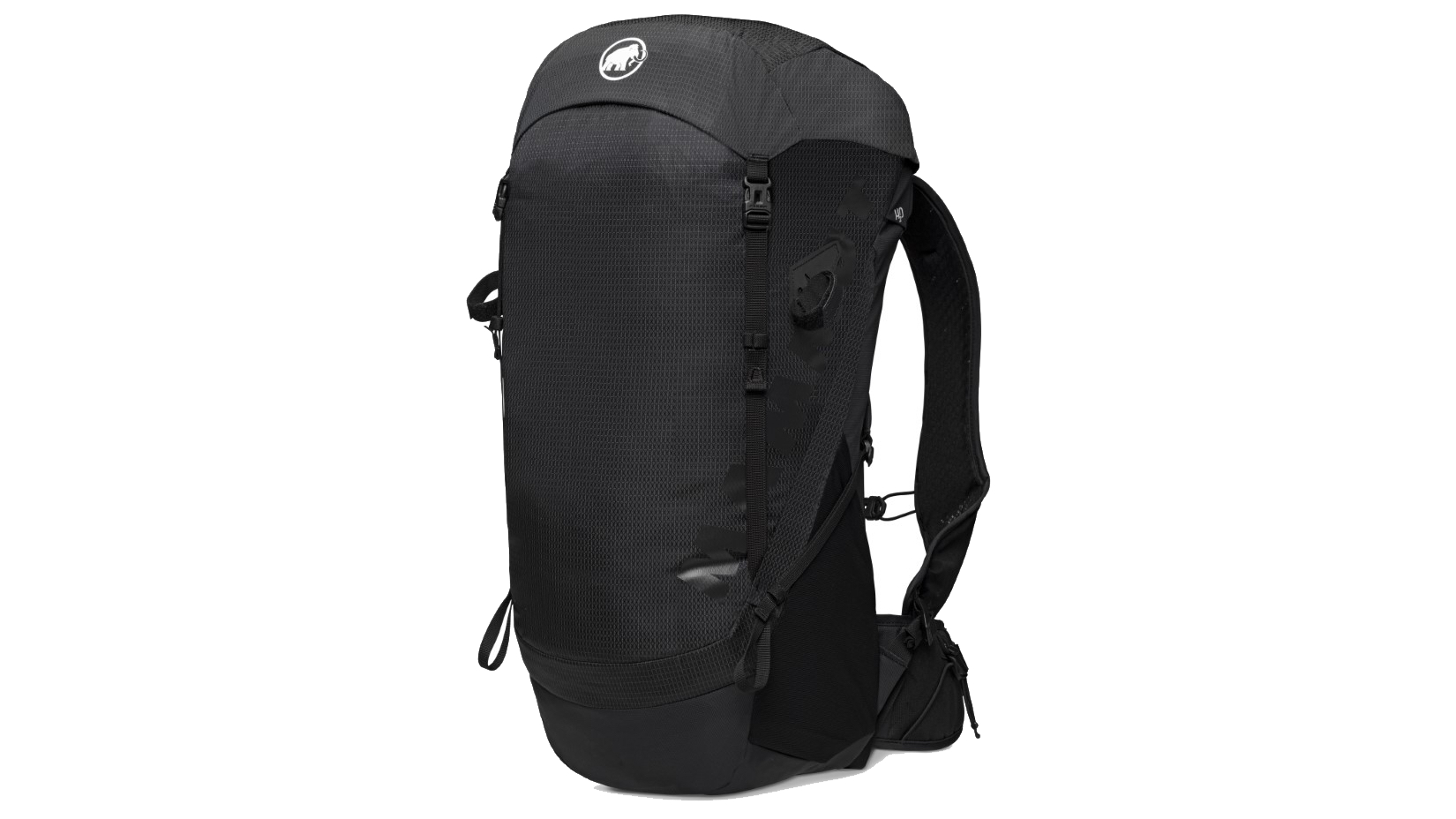
Specifications
Reasons to buy
Reasons to avoid
The shoulder strap system on the Ducan makes it a stand-out pack. It features an elastic, padded material that merges comfortably with the chest strap – something other daypacks seem to incorporate as an afterthought. The shoulder straps also include a snug, elastic pocket built in that is actually big enough to hold a smartphone. Combined with the Ducan 24's gossamer weight, the superior venting of the back panel makes this the perfect pack for hikers who put out a lot of heat, or prefer to explore in hot temperatures.
Despite its light weight, we found that the Ducan carries moderate loads quite comfortably. Under heavier loads, the pack will set lower on the hips but nonetheless stays in place without much trouble. The rain cover is integrated into the pack but is detachable for those who want to shave a few more ounces off.
Because it uses a thinner Polyamide/Polyester blend to save weight, the skin of the Ducan isn't as tough as thicker denier nylon packs, but the compromise saves weight, and for hikers who want to go fast and light, the Ducan is ideal. The lack of outer pockets is a slight nit-pick.
Read our full Mammut Ducan 24 review
The best panel loading daypacks
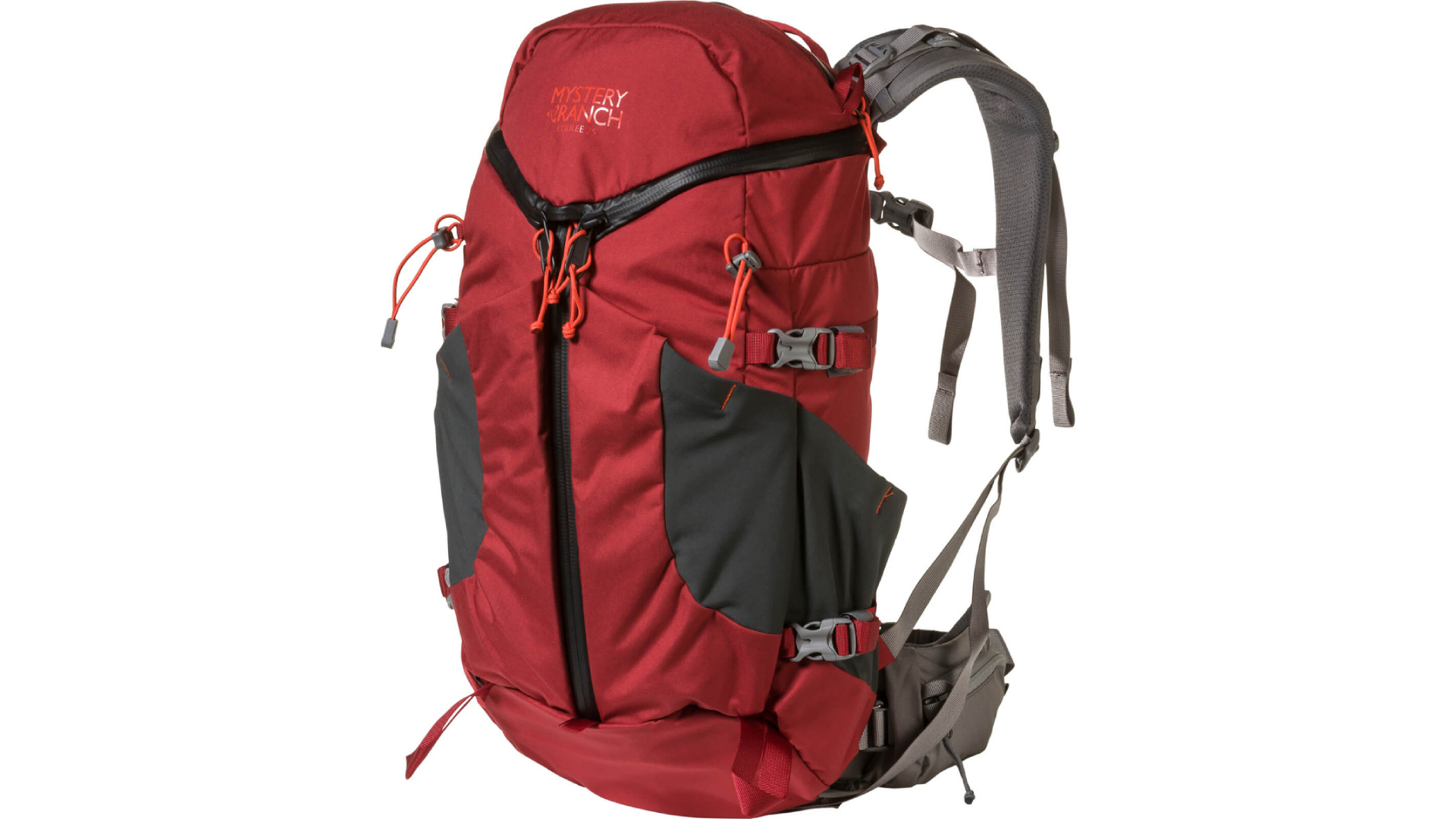
14. Mystery Ranch Coulee 25
Our expert review:
Specifications
Reasons to buy
Reasons to avoid
Mystery Ranch Packs are in a class of their own when it comes to weight distribution. Regardless of the load, the Coulee 25's frame sheet and patented Futura Yoke takes the burden off the shoulders and disperses it comfortably to the hips. We discovered this was obviously evident after a long day of hiking, when the fatigue that normally settles in on the neck and shoulders is pleasantly absent. Mystery Ranch is able to do this without adding excessive weight to the pack, which in itself is a bit of a wonderful mystery.
We love the 3-ZIP interior pack access, which is much more than a novelty. It makes finding gear that has settled to the bottom of your daypack a cinch (one of the key benefits of any panel-loading pack). The top triangle of the 3-ZIP system actually hides a gear compartment, which could technically qualify the Coulee 25 as a hybrid panel-loader top-loader.
The side-stretch pockets on the sides are deep, snug, and don't interfere with the full zipper that runs down the length of the back of the pack. Compression straps, hydration sleeve, and zipper pulls are good quality, standard fare for higher-end daypacks.
If you plan on carrying a heavier load, the Coulee 25 can't be beat for comfort and weight distribution. Minor downsides are the higher price tag and the lack of a sophisticated venting system.
The best women's specific daypack
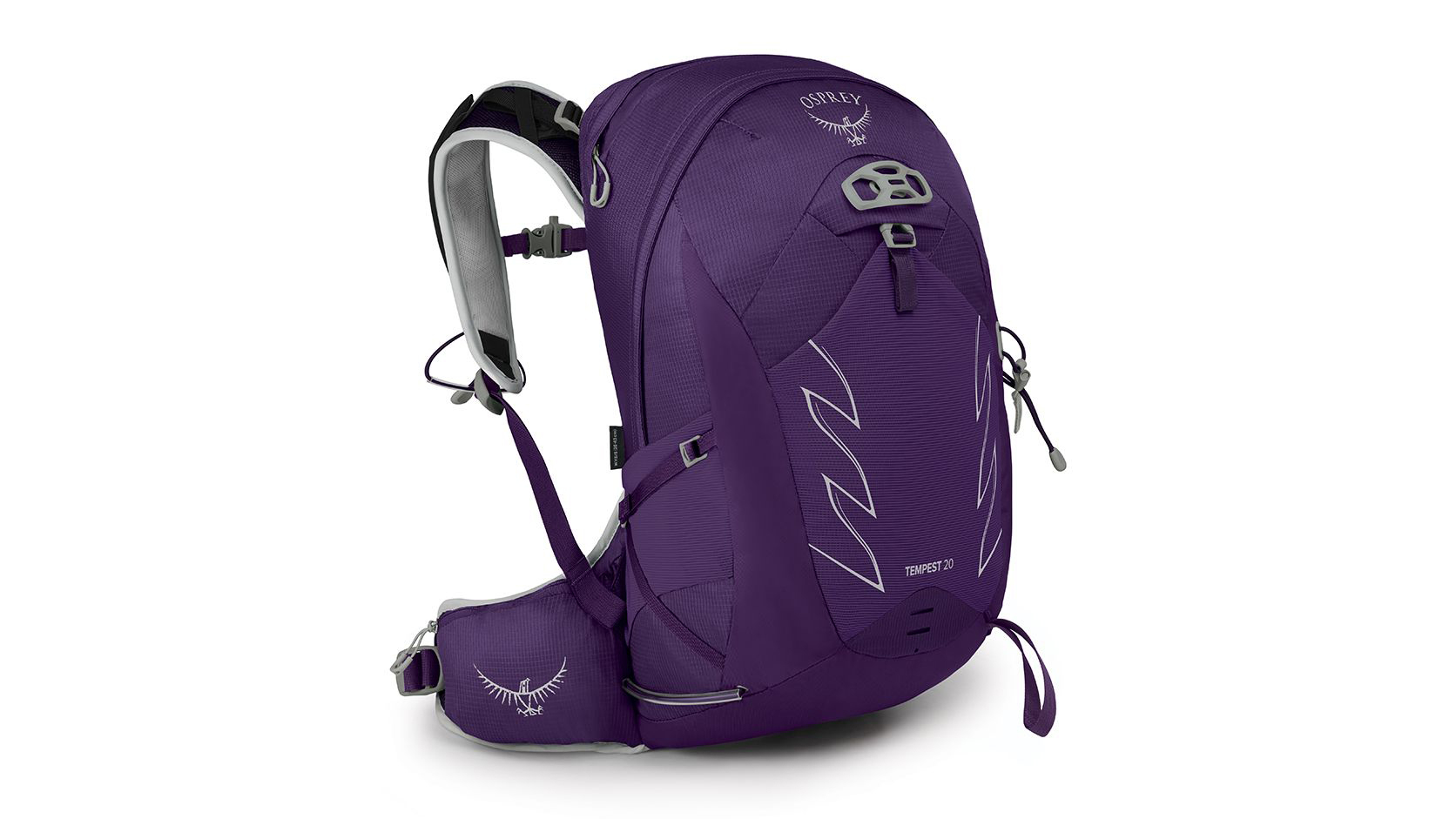
15. Osprey Tempest 20
Our expert review:
Specifications
Reasons to buy
Reasons to avoid
Osprey has been a leader in women-specific pack design for years and the Tempest 20 is the perfect example why they are regarded as pioneers. ‘One size fits all’ simply doesn't work well for most women and thus, Osprey has done well to offer variations from extra-small to large. Our testers reported that the narrower shoulder strap geometry and waist belt location were huge improvements over trying to adapt to men's packs. The Tempest 20 stayed stable, even on jarring downhills and on scrambles. Pack ventilation is excellent, even on scorching hot days.
The Tempest is the women's counterpart to another pack on our best daypacks list, the Talon 22. As such, it has the same great pocket layout, generous panel-loading main compartment, hydration sleeve, and wide rear panel pocket as the Talon 22. As an added bonus, the variety of colors makes personalizing the pack fun.
Great fit, stylish lines, and optimal functionality makes the Tempest 20 our top women's daypack. The only slight gripe is that it doesn’t come with a rain cover – you can buy one for a sizeable extra layout of $34–40 / £20–22.
Best daypacks comparison table
| Daypack | Price | Weight | Style | Best use |
| Exped Impulse 30L | $153 (US) / £115 (UK) | 978g / 2.1lb | Technical daypack | Technical hiking, cycling, climbing and scrambling |
| Osprey Manta 24 | $195 (US) | 1.3kg / 46oz | Technical hydration daypack | Day hiking, light winter walking, scrambling, via ferrata |
| Montane Azote 32 | $135 (US) / £110 (UK) | 925g / 33oz | Technical daypack | Technical hiking, cycling, climbing and scrambling |
| Sea to Summit Flow 35L Dry Pack | $200 (US) / £185 (UK) | 1kg / 2lb 3oz | Waterproof daypack | Day walks and weekend treks in wet weather, coastal and river adventures, SUPing and other paddle sports, canyoning / skiing |
| Red Original Waterproof Backpack 30L | $199 (US) / £99.95 (UK) | 975g / 34oz | Waterproof daypack | Day walking, coastal and river adventures, paddle sports, commuting |
| Black Diamond Speed Ascent 30 backpack | $185 (US) / £140 (UK) | S–M 990g / 2lb 3oz; M–L 1,140g / 2lb 6oz | Mountaineering and Climbing daypack | Climbing, scrambling, mountaineering and high-altitude hiking |
| Jack Wolfskin ACS Crosstrail 32 | $149.95 (US) / £110 (UK) | 1180g / 41.6oz | Large hiking daypack | Day walks in all conditions, fastpacking adventures, one-night escapades and longer hut to hut hikes |
| Deuter Futura 30 | $130 (US) / £95 (UK) | 1480g / 52oz | Technical daypack | Technical hiking, mountaineering, climbing, scrambling |
| Fjällräven Abisko Hike 35 | $155 (US) / £150 (UK) | 1400g/49oz | Hiking daypack | Hiking, hut-to-hut-trekking |
| Helly Hansen Transistor Backpack | $170 (US) / £150 (UK) | 775g / 1lb 11oz | Hiking daypack | Day hiking, biking, running, scrambling, peak bagging climbing and all sorts of one-day trail-based pursuits |
| Osprey Talon 22 | $120 (US) / £87 (UK) | 725g / 25.6oz (small/medium); 771g / 27.2oz (medium/large) | Compact daypack | Speed hiking, hut-to-hut trekking, scrambling |
| Mountain Hardwear UL 20 | $80 (US) / £58 (UK) | 303g / 10.7oz | Ultralight daypack | Speed hiking, hut-to-hut trekking, scrambling, winter walking |
| Mammut Ducan 24 | $130 *US) / £95 (UK) | 907g / 32oz | Hiking daypack | Speed hiking, hut-to-hut trekking |
| Mystery Ranch Coulee 25 | $175 (US) / £127 (UK) | 1304g / 46oz | Hiking daypack | Hiking, hut-to-hut trekking |
| Osprey Tempest 20 | $130 (US) / £94 (UK) | 861g / 30.4oz (XS/S); 997g / 35.2oz (M/L) | Women specific, compact daypack | Speed hiking, hut-to-hut trekking, scrambling |
How we test the best daypacks
You can trust Advnture
Our reviewers test daypacks on trails in a range of environments and conditions – from hiking, running and fastpacking, through to commuting and travelling – carrying various weights. Features (including design, carry capacity, harness comfort, hydration-considerations, product weight, materials, pockets and ease of access) are tested against claims made by the brand, and we assess factors such as value for money, durability and functionality.
Meet the testers
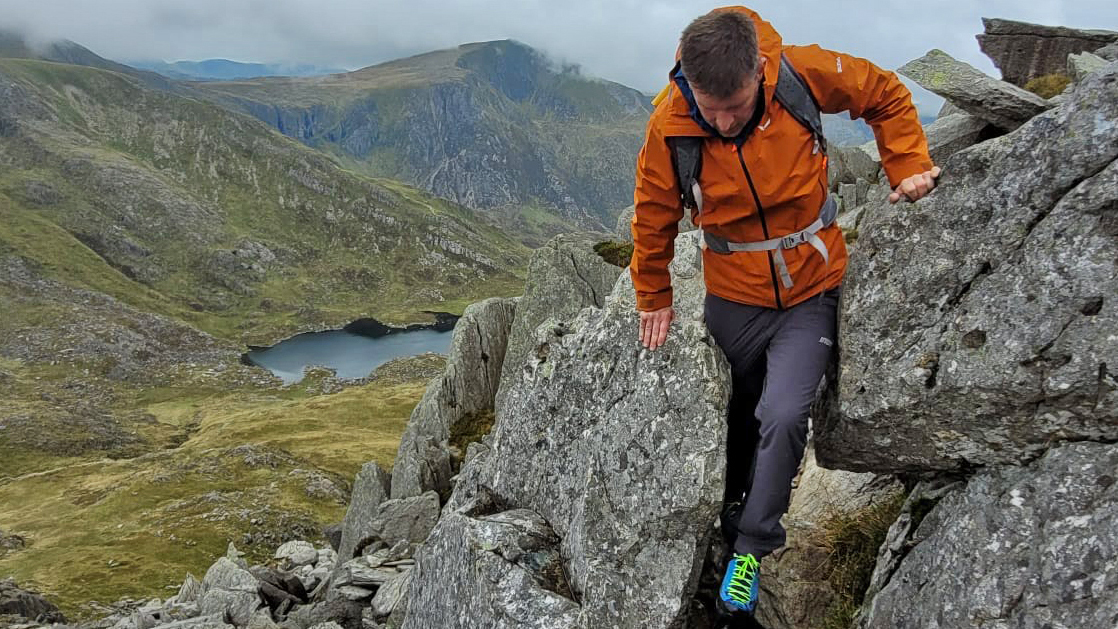
Writer, editor and enthusiast of anything involving boots, bikes, boats, beers and bruises, Pat has spent 20 years pursuing adventure stories. En route he’s canoed Canada’s Yukon River, climbed Mont Blanc and Kilimanjaro, skied and mountain biked through the Norwegian Alps, run an ultra across the roof of Mauritius, and set short-lived records for trail-running Australia’s highest peaks and New Zealand’s Great Walks. He’s authored walking guides to Devon and Dorset, and once wrote a whole book about Toilets for Lonely Planet. Follow Pat’s escapades here.
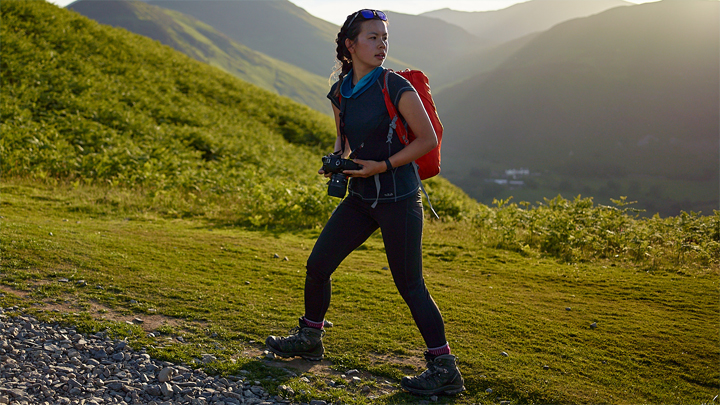
A former brand ambassador for Merrell and current Ordnance Survey #GetOutside Champion, Jessie Leong’s lifelong outdoor odyssey began with Duke of Edinburgh’s Award walks in the Peak District. This segued into long hill hikes in the Yorkshire Dales, multi-day treks in the Lake District, scrambles in North Wales and adventures scaling alpine pinnacles. When not walking, she can be found rock climbing, wild swimming, cycling, photographing, filmmaking, writing and modelling. Jessie’s most recent claim to fame is playing a Miss World contestant in the 2020 feature film Misbehaviour.
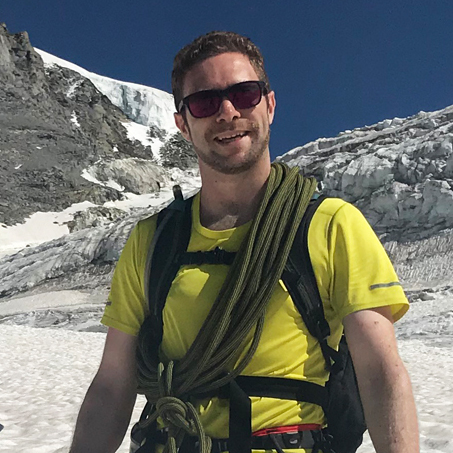
Alex is a qualified Mountain Leader and writer with an insatiable passion for the mountains. A Cumbrian born and bred, his native English Lake District has a special place in his heart, though he is at least equally happy in North Wales, the Scottish Highlands or the European Alps. Through his hiking, mountaineering, climbing and trail running adventures, Alex aims to inspire others to get outdoors. He is currently President of the London Mountaineering Club, training to become a winter mountain leader, looking to finally finish bagging all the Wainwright fells of the Lake District and hoping to scale more Alpine 4000ers when circumstances allow.
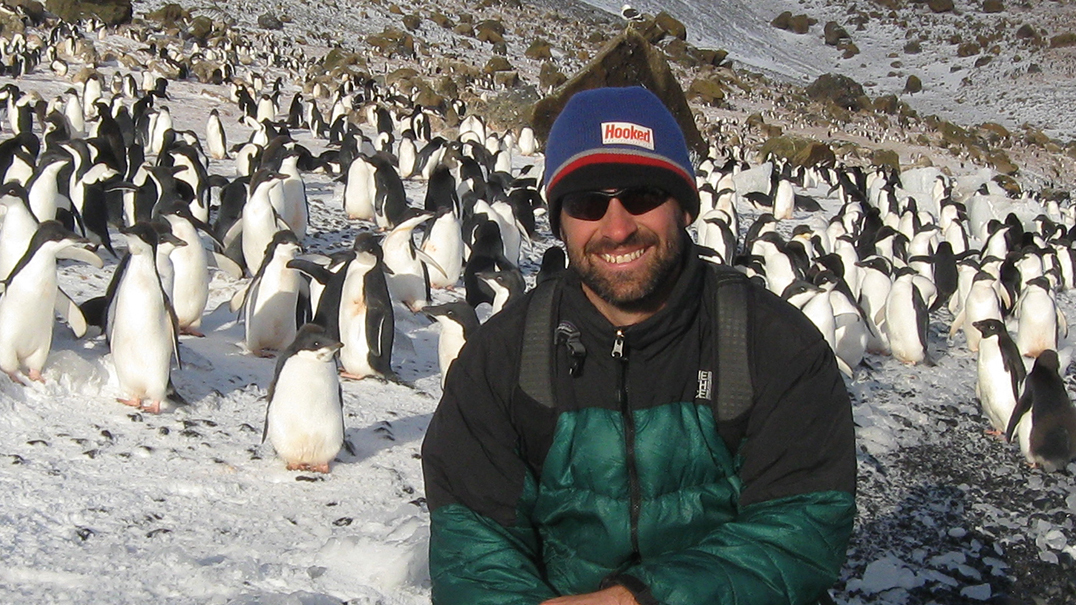
The best-selling author of five Colorado mountain hiking guidebooks, including Best Summit Hikes in Colorado, James’ work has been published in National Geographic, Backpacker, Outside, Discover Magazine, and many more. He's climbed in Greenland, the Canadian Arctic, Japan, and Antarctica. James lives in Boulder, Colorado with his wife Sheila and their two rescue collies, Mystic and Fremont. As of 2021, he's only had one of his tents trampled by a moose.

After spending a decade as editor of Country Walking, the UK’s biggest-selling walking magazine, Jonathan moved to edit Outdoor Fitness magazine, adding adrenaline to his adventures and expeditions. He has hiked stages or completed all of the UK's national trails, but was once overtaken by three Smurfs, a cross-dressing Little Bo Peep, and a pair of Teletubbies on an ascent of Snowdon. (Turns out they were soldiers on a fundraising mission.)
What to look for when buying the best daypacks
When properly cared for, the best daypacks can last for decades. Rarely does a daypack suffer catastrophic failure like tents, nor are they prone to the intense wear-and-tear of boots. Parts that need replacing, such as straps, clips, and zippers are rarely cost-prohibitive. You're more likely to retire a daypack to the eager jaws of critters such as marmots or mice than from overuse.
The takeaway is that a daypack may be one of the very best gear investments you'll make, so investing in the best daypack to fit your exact style is a decision you will not regret.
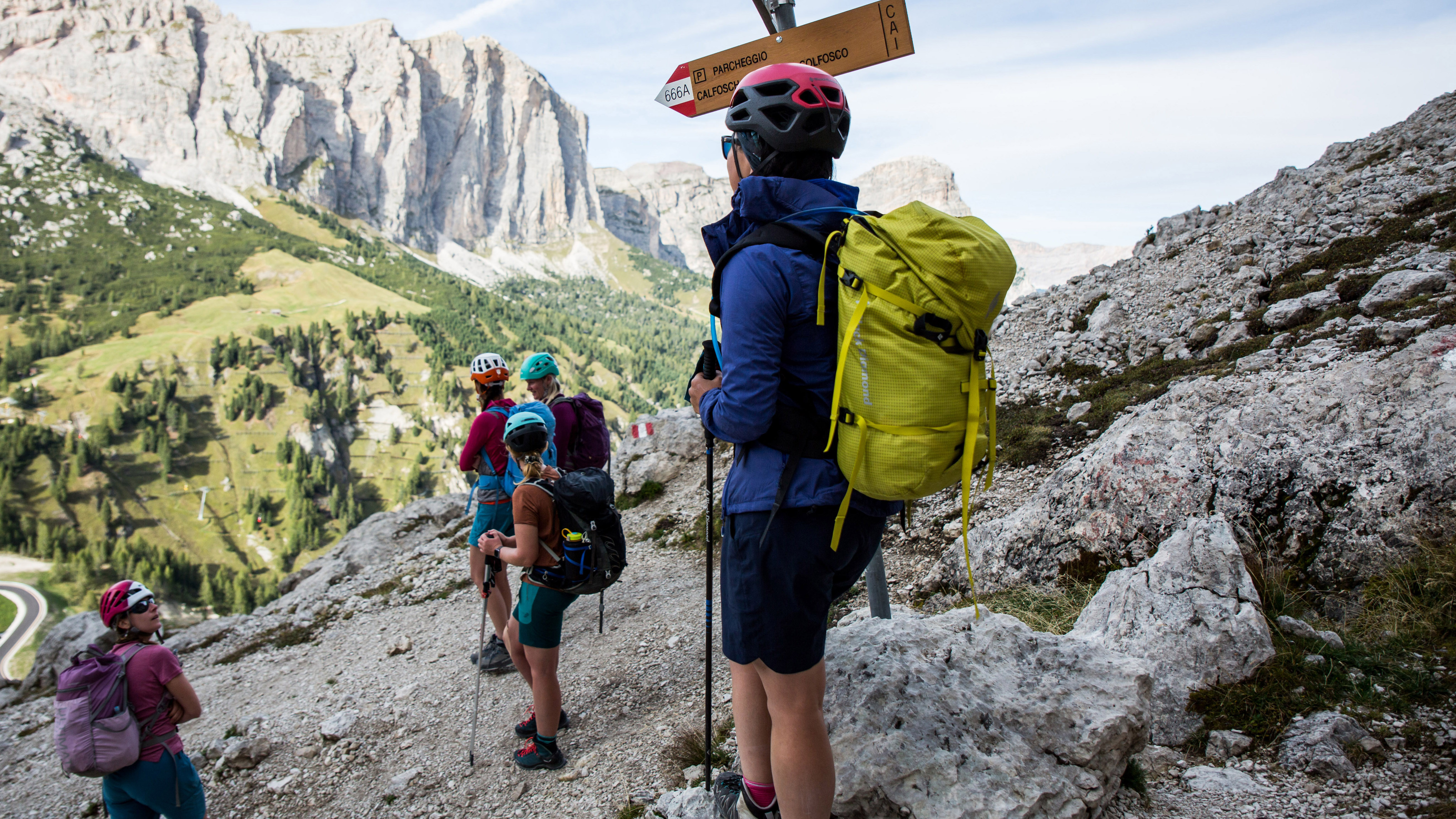
Because of the fabrics used in their construction, nearly all modern daypacks have a natural resistance to water. However, if you live in an area where rain, fog, and moisture is common, it's worth investing in a pack cover to keep your gear dry – and you can line your pack with a kitchen-size garbage bag for good measure. However, you can also employ smaller dry bags within your pack to ensure the essentials stay dry.
This leads us to our next point. When you try on a daypack, be sure to do it with roughly the amount of weight you expect to carry and, if possible, with the jackets and layers you are likely to be wearing. Venting is more important to the desert hiker than it is for the winter snowshoer.
When purchasing a pack, we recommend considering the following factors:
Pack Volume
For many hikers, packs less than 18L are too small for most day hikes – specialized summit packs excepted. Standard size for daypacks ranges from 18L–22L for less volume and 22L– 30L for more volume. Above that, you start getting into overnight backpacks.
A good sweet spot for an all-round daypack is 25L. It's more than enough space for layers, snacks, and extras like maps, guidebooks, or flasks of your favorite spirits. Larger packs, 25L–30L rucksacks, are good if you're adding in gear for your kids, dogs, thick winter layers, or climbing gear. Packs smaller than 25L are great for going light and fast, especially for warm weather hiking. You should also consider the best hydration packs if you're someone who likes to hit the trails with a bit of speed.
We have included a couple of summit packs here. These are ultralight daypacks that scrap excess materials, including an inner frame, for the sale of lightness. They are designed for summit hikes and exploratory adventures out of basecamp, but can be handy as a daypack option when you’re travelling too.
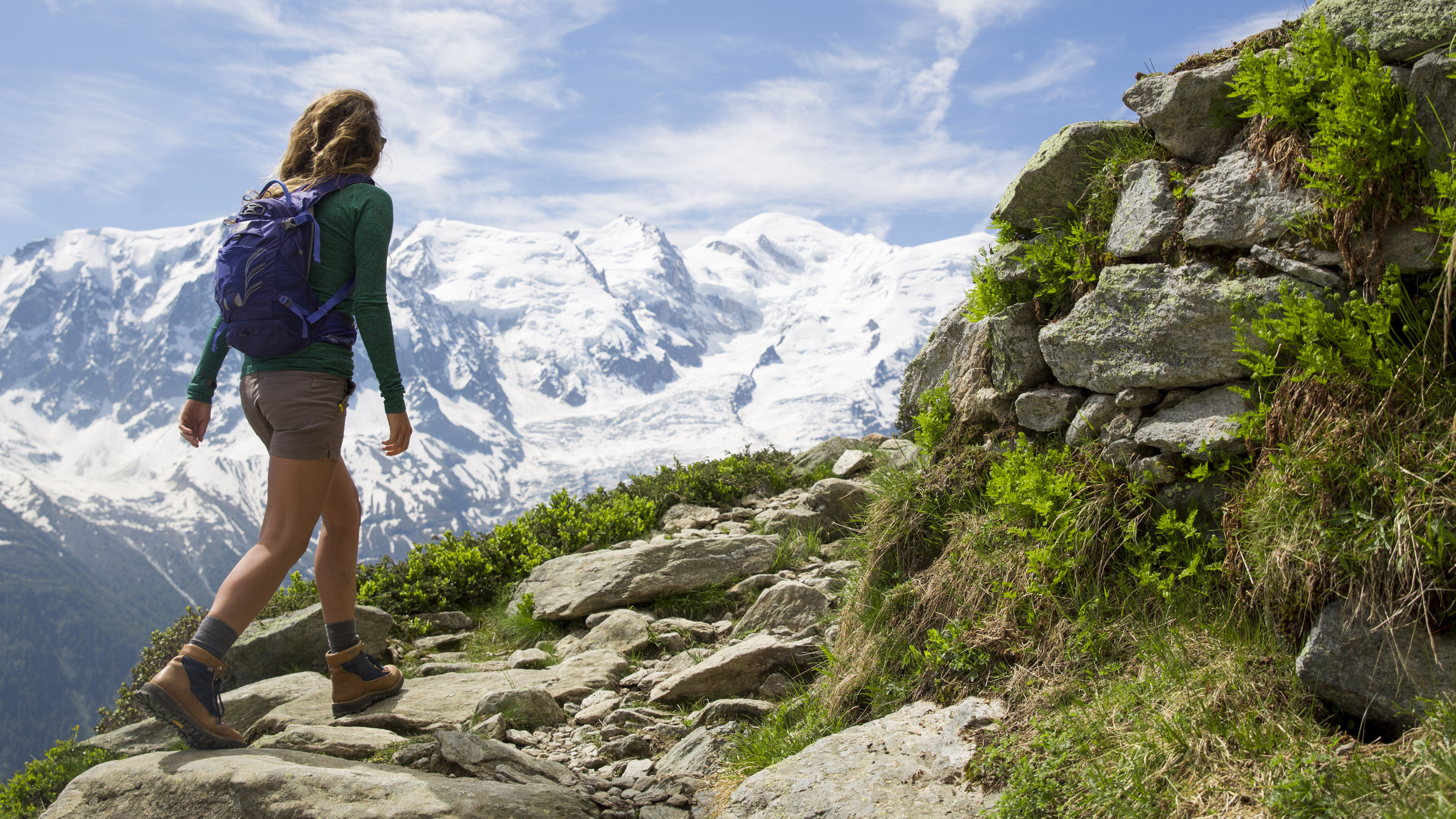
Fit and Comfort
The best daypacks will distribute weight into the waist straps – not as dramatically as full-sized backpacking packs, but enough to give your shoulders a bit of a break at the end of a long day. Nearly all backpacks offer a degree of adjustability but these adjustments have their limits. Thus the various sizes of small, medium, and large daypacks. Gear shops can help you size up the right pack and it's worth learning properly how to pack a backpack.
Gender specificity
Many women are perfectly fine using men's daypacks, which are often more-or-less gender-neutral. However, women with especially narrow shoulders or small torsos should consider trying on women-specific daypacks or one of the best women's hiking backpacks. A women's specific pack may carry weight as comfortably as a men's pack, but the shoulder straps may be much easier to put on, adjust, and take off, and the chest strap should take into account the female form.
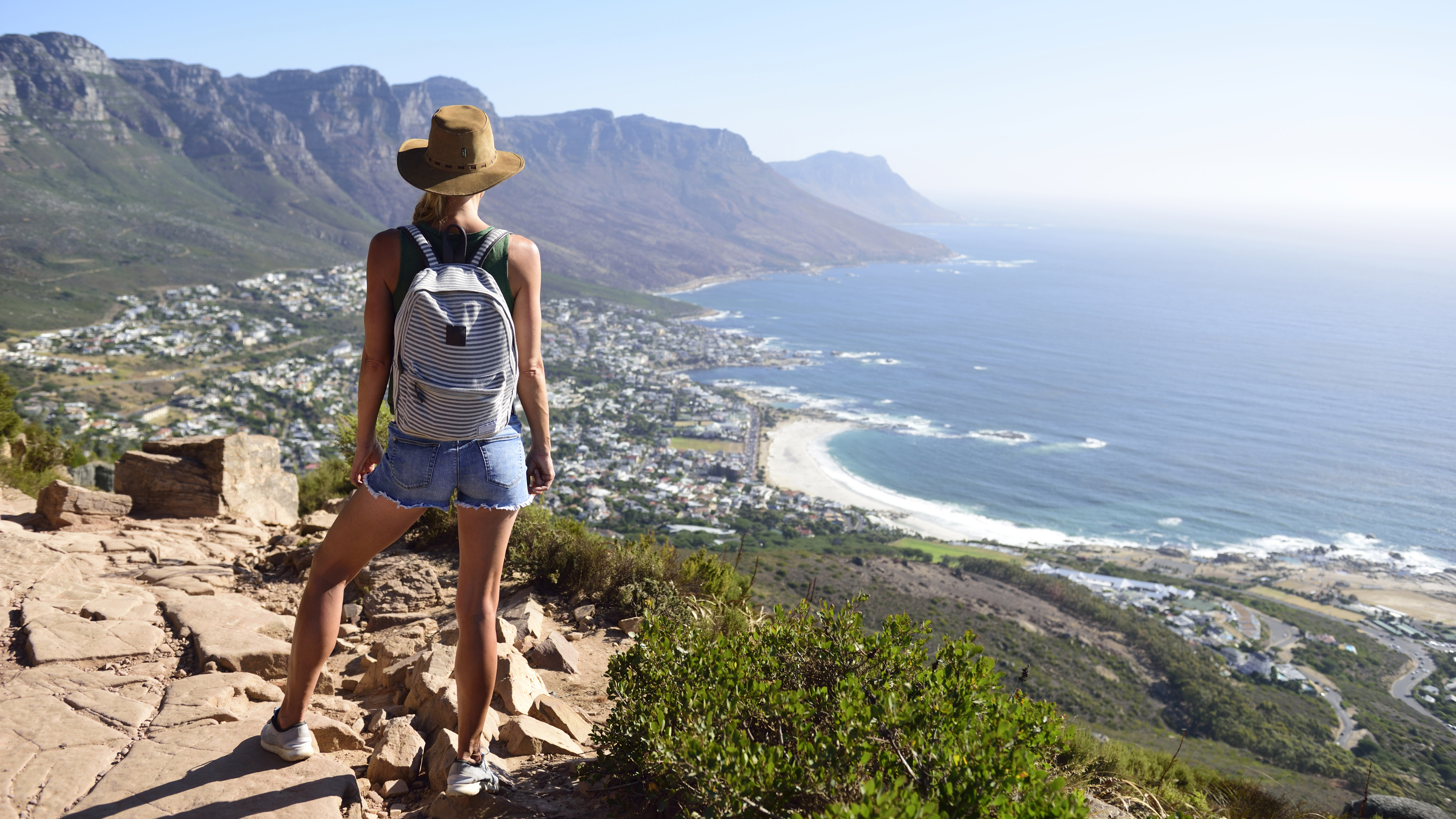
Price
When you're thinking about how to plan a backpacking trip, budget is often a real consideration. It can be tough to bite the bullet and pay upwards of $200 (US) /£150 (UK) for a relatively small pack, especially when there are many cheaper daypacks available. Beware, however, that a glorified bookbag will reveal its weaknesses on the trail. The most glaring difference between budget models and high-quality brands comes in the geometry and fit. Your shoulders will tell you all you need to know about that if you spend 6 or more hours with a poorly fitted pack.
As mentioned above, daypacks are a very good investment, even if the upfront price can sting. The best daypacks can be expected to last at least 10 years, possibly longer. One way to save some money is to make sure you're not paying for features you don't care about or need. Basic, panel-loading daypacks have the least frills but are ideal for some hikers – and this preference can save a bit of money.
Features
Finally, this is one category that is entirely based on your personal preferences. We keep a top-loader for mountain hiking when we know we'll likely be taking hats and our best hiking gloves on and off throughout the day. We also have a nice panel loader for those days when we want to move quickly, suck up minor weather changes without re-layering, and only bring the basics. We like to have a single dedicated side-pocket for snacks and a hydration sleeve (both of which are standard on nearly all daypacks).
Conversely, lighter daypacks use elastic cord to store jackets on the outside of the pack or may omit side pockets altogether.
There is no one right answer. But keep this in mind: the more zippers, pockets, and straps, the more potential failure points exist. The upshot is that a single broken zipper on a side pocket likely won't make or break your day. Whatever you prefer, aim to invest in the best daypack that is functional for your personal system.
Advnture Newsletter
All the latest inspiration, tips and guides to help you plan your next Advnture!

Author of Caving, Canyoning, Coasteering…, a recently released book about all kinds of outdoor adventures around Britain, Pat has spent 20 years pursuing stories involving boots, bikes, boats, beers and bruises. En route he’s canoed Canada’s Yukon River, climbed Mont Blanc and Kilimanjaro, skied and mountain biked through the Norwegian Alps, run an ultra across the roof of Mauritius, and set short-lived records for trail-running Australia’s highest peaks and New Zealand’s Great Walks. He’s authored walking guides to Devon and Dorset, and once wrote a whole book about Toilets for Lonely Planet. Follow Pat’s escapades on Strava here and Instagram here.
